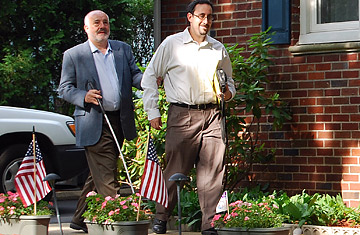
Rabbi Dr. Dennis Shulman is a candidate for Congress in New Jersey's fifth district.
Sure, times are tough for Republican incumbents all over the country, but you wouldn't want to be running Scott Garrett's congressional reelection campaign. Sure, he holds a seat in New Jersey's solidly Republican 5th district that has been GOP property for decades, and there are almost twice as many registered Republicans as Democrats in the affluent district. But who'd want to run for the party of an epically unpopular president when the opponent is a blind rabbi?
Blind since his childhood, Dennis Shulman graduated from Brandeis with honors, has a Ph.D. from Harvard, is a nationally-recognized psychologist, a published author, and was ordained as a Reform rabbi in 2003. Not exactly an underachiever, but Shulman has set himself the challenge of becoming the first Rabbi ever to serve in Congress — and the first blind congressman since 1935.
A self-described mainstream Democrat, Shulman is "outraged" by the direction in which the Bush Administration has taken the country. And despite Garret's advantages of incumbency, he believes he has a decent chance of unseating the Republican. According to his campaign's internal polling, the district has caught the "change" bug: 69% of the district thinks the country is on the wrong track, and even Republican voters overwhelmingly disapprove of President Bush's performance. According to the Shulman numbers, the district's lopsided Republican-to-Democrat registration notwithstanding, an equal number of voters plan to vote Republican (39%) as plan to vote Democrat (39%).
Will his status as a rabbi help him in a district where no more than 10% of the electorate is Jewish? Opinion is divided. David Wasserman, the House Editor at the non-partisan Cook Political Report believes it could count against the Democrat: "My biggest concern about Shulman's viability is that he's a rabbi, and I think voters in this district tend to want to keep religion out of politics," he says. But John McArdle, a staff writer for Roll Call, disagrees: "He draws you in with the story and then he speaks very well about policies," says McArdle. "He does a very good job of using that to hook people in and then talking about change and making charges against Garrett."
The rabbi's prospects, however, may depend more on the national trends. "Candidate quality matters less and the national climate matters more [in the 2008 election cycle]," says Wasserman. "The political climate for Republicans continues to be so bad that even some of these relatively safe districts are worth keeping an eye on." But the Garrett campaign insists it isn't worried. "In the past we've heard people say this year it's going to be competitive," says campaign advisor Matthew Barnes, "and each year the voters respond by reelecting [Garrett] overwhelmingly."
Barnes' confidence is based on the district's voting history, but treating this election year as typical could backfire. Nationwide political sentiment is not kind to Republicans, right now, and in Shulman Garrett faces an adversary unlike any he has previously bested. Bolstered by voter dissatisfaction and his compelling life story, Shulman had already raised more money by June 30 than the last Democratic candidate amassed over the entire 2006 campaign — and national party leaders are paying attention.
In June, House Majority Leader Steny Hoyer joined Shulman on the stump and personally delivered a check for $2,500, the second such contribution from his political action committee. A few days later, the Democratic Congressional Campaign Committee announced that New Jersey's 5th was being targeted as one of 20 "emerging races" the party believes are in play, and paid for a local anti-Garrett radio ad that tied the incumbent to President Bush. With roughly seven times as much cash on hand as its Republican counterpart, the DCCC hopes to open up previously uncompetitive seats in order to force the GOP to dilute its own resources to defend what had once been safe seats.
Shulman, as his resume reflects, is a driven man, and he promises to take his can-do-better attitude to Capitol Hill. "That's not just political bullshit," Shulman laughs, "it really is the theme of the way I think about myself as a psychotherapist, a rabbi, a teacher, a father, and as a blind person." Win or lose, Shulman, who runs a Sabbath morning discussion group at his synagogue (currently they're dissecting the Book of Job), views entering the political race as an ethical imperative. He often frames issues such as universal healthcare and energy policy in moral terms, and adopts an almost righteous anger when discussing Garrett's positions on social welfare programs such as SCHIP and Head Start. "I really felt that I needed to put my mouth where my ethics and religious sensibilities were," says Shulman.
While Garrett may be the district's traditional choice, any political professional from either party will confirm that these are unconventional times. So, the fact that Shulman is anything but a conventional candidate may yet turn the race for New Jersey's 5th District into a humdinger.
